
| Home |
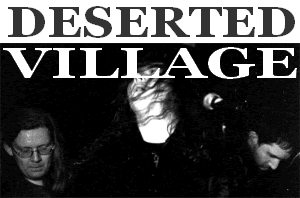
In 1770, Irish writer Oliver Goldsmith (best known for his novel The Vicar of Wakefield and his play She Stoops to Conquer) wrote an epic poem - The Deserted Village - in memory of his brother. In the poem, Goldsmith uses near hallucinogenic imagery to evoke a sense of landscape and life on the land, in a time when modernization was dispossessing the land's original inhabitants and changing its character irrevocably. Fast forward to the early 21st Century, and the abiding sense of melancholy beauty conjured by Goldsmith in this work applies equally to the works of a new wave of underground Irish musicians orbiting micro-brewed labels like Deserted Village, Deadslackstring and Rusted Rail. These labels exist as a natural extension of these collectivist endeavours, because without them there would be little other way for their music to be heard. Pre-eminent among these is Deserted Village, with some 30-or-so releases to its name in a handful of year's existence.
Deserted Village started as a way to release the work of drone-improvisation outfit Murmansk, which itself grew out of an improvisation workshop conducted by the legendary Eddie Prevost-led ensemble AMM. Their complex future course was signposted by a second CD-R release, 'Music from the Deserted Village', which contained everything from drone to free jazz to lo-fi bedroom pop oddities to pristine psychedelic folk. (Go to their web site: like a number of the early Deserted Village releases you can download it for free now.) A string of releases explored these avenues; some accessible like underrated releases by Townparks Foundry and The Cosmic Nanou, and some gnarly and confronting, like releases by Amygdala, Wrecking Ball, and Weapons of Mass Destruction. And the drone continued with a second Murmansk CD-R and Agitated Radio Pilot's superbly evocative 'A Drifting Population'. Central to the label was the United Bible Studies collective concept, represented directly by the 'Stations of the Sun, Transits of the Moon', 'Airs of Sun and Stone' and the masterful 'The Shore that Fears the Sea', but also represented indirectly by nearly everything else, and most strikingly by the acoustic project Magickal Folk of the Faraway Tree, whose two CD-Rs were snapped up be fans and collectors on release. Fear not though, a compilation CD of the MFFT material is forthcoming.
As the music industry consumes itself with false prophets and manufactured scenes, labels around like Deserted Village are going to be increasingly important carriers of the torch of the underground. They are all about the music and really that's all that matters, whether the potential audience for your thing is 20 or 20,000. The handmade nature of the products gives the artists complete control over every aspect of their art, and the Internet the ideal means of promotion and sales. The Terrascope spoke to label kingpin Gavin Prior and United Bible Studies mainstay Dave Colohan about the label and its music.
T.O. Most labels start with something like a manifesto or statement of intent; basically some kind of hole that the creators feel will be filled by the label's creation and forward motion. In the case of Deserted Village, what was the imperative?
GP. At first, our motive was to get our own music out. It didn’t look like anyone else was going to do it. Initially I had a sense of us casting our music into a vast unknowing, uncaring void. Of course, we weren’t alone. It was encouraging to find more and more labels getting music out there.
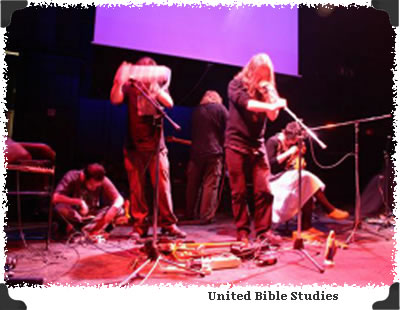 T. It seems like one reason for
Deserted Village to exist is to provide a conduit for the works of the
United Bible Studies collective. Can you explain what the United Bible
Studies concept is all about, where it got its name, and how it relates to
the Deserted Village label?
T. It seems like one reason for
Deserted Village to exist is to provide a conduit for the works of the
United Bible Studies collective. Can you explain what the United Bible
Studies concept is all about, where it got its name, and how it relates to
the Deserted Village label?
DC. UBS took its name from a prayer book which belonged to one of the early members and was intended as a joke. However, he thought it was a wonderful name and in the end so did we. UBS existed before we set up Deserted Village and grew like the flesh around its bones. It absorbs all of the musics we love, mostly because there are so many people involved coming from different backgrounds. We started as a duo in Trinity College Dublin where James Rider was studying at the time...2001ish . I had just returned from living in Australia and as we had already been friends, we decided to form a band together after a well spent afternoon listening to Incredible String Band records. Our original plan was to follow in their footsteps and play as a duo, both of us loving folk music and eager to explore the myriad possibilities. However, the sheer enjoyment of playing with others led towards the group becoming the sprawling collective it is today. The Incredible String Band still loom large over the group. While live we are generally in the psychedelic rock realms - folk, jazz, noise, metal, hip hop, electronica and everything under the moon is drawn upon while we search for the white lights. Lyrically I tend to explore pagan themes: nature, mysticism and such. That said, when we are all sweating on stage like a bunch of Battle Metallers, I have my misgivings!
T. What are the benefits and
drawbacks of being primarily a CD-R label, and now you've started releasing
some things on CD, is that a natural direction for the label as it becomes
better known, or will you still release in both formats?
GP. I'm sure we'll continue to release both formats. We'll still put out
music that won't sell many copies. CDs are nice because they're less labour
intensive and can reach more people without going out of print too quickly.
We’ve been getting a good response to the free downloads on our LastFM page
and there’ll be lots more in the future. Obviously downloads are the future
and increasingly part of the present. Downloads have really killed CDs for
me. I have tonnes of digital music on my hard drive (I’m listening to
Beyonce as I write) and limited space in my house. Why would I be bothered
sifting through digital recordings in their physical form (gammy, gakky
plastic mostly) just to stick a CD into my computer? When I did my surly
apprenticeship in a second-hand record shop we’d get people coming in with
their entire CD collection which they’d just ripped to their MP3 players.
They’d mostly have the same 200 generic albums. Tripping over worn Chilli
Peppers jewel cases all day made them seem even less loveable. It’d be cool
if downloading would destroy the music industry. It won’t but it might lead
to less ugly plastic clogging our dying planet. Anyway downloading might
lead to even more creativity in handmade covers on the part of micro-labels
which is one of the main advantages of CD-Rs and limited runs.
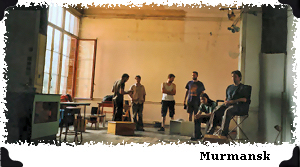 T. The first release on the label
was by the drone/dark ambient project Murmansk. How did this project come
about and how does Murmansk link to the UBS concept?
T. The first release on the label
was by the drone/dark ambient project Murmansk. How did this project come
about and how does Murmansk link to the UBS concept?
GP. The project came about during an AMM weekend in Dublin, which included an AMM gig, solo performances by the members and a workshop hosted by Eddie Prevost. My housemate Shane Cullinane got me to come along to the workshop in the afternoon. Scott and Dave had travelled there from Galway, and Scott knew Paul McGeogh, though he is no longer in Murmansk. That evening, Eddie Prevost and the workshop played support to Keith Rowe playing a solo set. Numbers were exchanged. Most of the good things that happened in my life since then can be traced back to that workshop. Personally, I think Murmansk now suffers from an identity crisis as UBS has expanded to explore murkier areas of improv which might previously have been thought of as Murmansk territory. I still think we’ve put out some fine recordings with that group though.
T. Your compilation "Music from the Deserted Village" pretty early established a label that was going to cover the span from gnarly and challenging improv-skronk to almost traditional folk. Was this the intent at the outset and how important is the ethos of improvisation to Deserted Village and UBS?
GP. When we set up the label we all had wide-ranging interests as listeners and musicians. Naturally we wanted to reflect this. Improvisation is central to the ethos of Deserted Village and UBS in particular. It allows the membership of UBS to be open-ended and flexible. As we've discussed, The Village owes its existence to an improv workshop.
T. A lot of the earlier releases on the label were either quite challenging, almost free jazz in spirit (Amygdala, Wrecking Ball, Weapons of Mass Destruction) or lo-fi pop and psychedelia (Townparks Foundry, The Cosmic Nanou). Most are characterized by a kind of haziness regarding things like personnel, instrumentation, dates (not completely, but it’s a trend for sure). It's almost as if you're removing context and encouraging the listener to create their own mythologies around the music (rather than individuals). What can you tell us about these early projects, and how they were received at the time and how you view them now?
GP. When we started nobody knew or cared who we were so there wasn't much need to list personnel. I've always thought that too much text clutters artwork especially on our minimal CD-R packaging. We've bucked the trend on our forthcoming live album 'Black Colcannon' which has exhaustive credits. Perhaps we feel that people care more nowadays. Amygdala, Wrecking Ball and Weapons of Mass Destruction are probably our three most unpopular releases and never got much reaction then or now. I played on the Amygdala and WMD releases and I think they've stood the test of time...... so far. That said, I almost never listen to recordings I've played on once they're released. The Cosmic Nanou is probably our most underrated release.
T. I guess for a lot of folks, the first Deserted Village releases they probably heard of were those by Magickal Folk of the Faraway Tree and the first United Bible Studies CD "Stations of the Sun, Transits of the Moon". Can you tell us a bit about how the Magickal Folk project came about, and also about how you feel the first UBS CD represents the UBS concept?
GP. UBS predates the Magickal Folk which started as a more “pure” and
acoustic based folk project. I came home one day to hear 'Le Bon Marain'
which was one of the first MF tracks Dave and Shane recorded. It was taken
from a Peter Kennedy collection of folk songs. I was gobsmacked to learn
that they had just put the words to their own music, it sounded so
authentic. 'Stations of the Sun, Transits of the Moon' is mostly taken from
two sessions. Dave had the idea to record improvised short tunes. Everything
was recorded straight to open mics without overdubs. We sat in a circle and
we’d play in various combinations of duos or trios. A take either worked or
it didn’t so nobody got too bored. 'Every time we find a dead Viking' was
the first glimpse of the raucous live incarnation of UBS. We played the Mor
festival the week after that was recorded. We were actually supposed to be
rehearsing for it instead of recording new stuff. I’ve just put it on after
not listening to it in ages and it sounds nice though my playing is fairly
clunky. It’s pretty but sounds a bit UBS-lite now. I can’t see us making
another record like that again somehow.
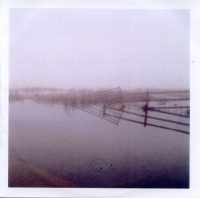 T. From the point of the Magickal
Folk on, there label seemed to move in a more psychedelic folk direction
with releases like UBS's "Airs of Sun and Stone" and "The Shore that Fears
the Sea", Agitated Radio Pilot's "The Days and Hill Grown Old"
[shown on the left], the Juniper
Meadows and Snow Machine releases, and most recently the Children of the
Stones project. Intuitively, Ireland should have had a long and illustrious
history of psychedelic folk, it's that kind of place/landscape but that
doesn't seem to have been the case. I can't think of too much from Ireland
over the past 30 years that I would characterize this way. Progressive folk
yes - Loudest Whisper, Mellow Candle, Horslips, Planxty, Fiona Joyce's first
- yes, but not psychedelic folk. Any thoughts as to why that is so?
T. From the point of the Magickal
Folk on, there label seemed to move in a more psychedelic folk direction
with releases like UBS's "Airs of Sun and Stone" and "The Shore that Fears
the Sea", Agitated Radio Pilot's "The Days and Hill Grown Old"
[shown on the left], the Juniper
Meadows and Snow Machine releases, and most recently the Children of the
Stones project. Intuitively, Ireland should have had a long and illustrious
history of psychedelic folk, it's that kind of place/landscape but that
doesn't seem to have been the case. I can't think of too much from Ireland
over the past 30 years that I would characterize this way. Progressive folk
yes - Loudest Whisper, Mellow Candle, Horslips, Planxty, Fiona Joyce's first
- yes, but not psychedelic folk. Any thoughts as to why that is so?
DC. Perhaps the reason psychedelic folk or rock never flourished over here
is because the longhairs of the day found more solace & inspiration in stout
& whiskey than in hallucinogens. Who knows? It didn't stop Dr Strangely
Strange emerging from the priest ridden landscape. Some of the childrens'
television of the time was way more out there than the music. Check out "Wanderly
Wagon" for adventures amongst standing stones and mythological figures. It
certainly did a job on me!
GP. As for a "psych-folk direction" I wouldn't read too much into that. It will always be an area of interest for us but I like to think the label will keep changing directions and head down dead-ends and diversions. In the past Ireland always seems to have lagged behind musically. We’re still a small island at the edge of Europe. There’s no underground journalism to speak of. Journalists don’t have any concept of bands who aren’t “trying to make it” I think there’s some great music coming out of Ireland (some of it psychedelic) these days but we’re not great at getting heard outside our country. In a big country like America you can tour and sell records for a month playing to 40 odd people a night. In Ireland there are still only about four towns where we can get gigs.
Back in the 60’s – 70’s it must have been even grimmer. The Irish youth were mostly into “Showbands” who worked the circuit like dogs playing cheesy, danceable rock n roll. I imagine with our small population it would be hard to build audiences for non-mainstream music. I’m pretty sure there were no clubs like the UFO where people dropped acid. Booze has always been the drug of choice here. The 70s and 80s were grim times economically. There was a severe brain drain: tens of thousands of the youngest emigrated every year. Irish Traditional music is very loaded with a sense of the past and the past would have meant poverty and grey catholic oppression to many so it probably wouldn’t have appealed to psychedelic people.
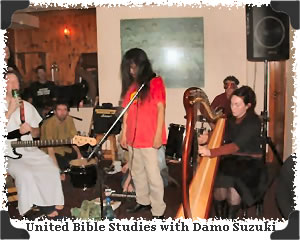 Ivan Pawle who plays in Sea Dog &
UBS (Limerick Chapter) is actually the son of one of the members of Dr
Strangely Strange, Ireland’s foremost Psych-folk group in their day.
Ivan Pawle who plays in Sea Dog &
UBS (Limerick Chapter) is actually the son of one of the members of Dr
Strangely Strange, Ireland’s foremost Psych-folk group in their day.
T. As a collective you seem to place a premium on improvisation. The live UBS CD 'Airs of Sun and Stone' is one example of this. Is this performance representative of UBS in a live setting? I suspect they are usually more chaotic than this peaceful piece of music.
GP. The last track on Black Colcannon is an entire gig we played supporting
Circle in Dublin and to my mind it's a great example of a "classic" UBS gig
in that it has songs which are improvised around. There was a lengthy period
when we played entirely improvised sets without ever playing songs. This had
very mixed results and we went through periods of ruts. When we play Dublin
there's usually no shortage of people to play so the sound is obviously more
full-on. When we play outside of Dublin people are less willing and/or
unable to play away from home so there tends to be a more stripped-down
sound. In limerick where 'Airs of Sun and Stone' was recorded, we're usually
joined by Áine on Harp and Ivan from Sea Dog on hurdy gurdy/synths/theremin.
They both live in Limerick although Ivan didn't play at this particular gig.
It definitely wasn’t a typical UBS gig; the time of day, location and
personnel (just four of us plus improvising dancers) all made for an
exceptional performance. Playing in a church gives you acoustics, atmosphere
and a freedom to play with dynamic range you don't get in noisy pubs. In
future I’d like us to play fewer gigs and play them in non pub venues.
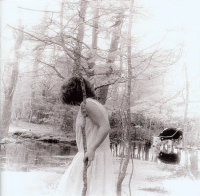 T. The UBS release 'The Shore
that Fears the Sea' [shown on the right] seems to bring a lot of Deserted Village strands
together, having elements like Murmansk, Magical Folk of the Faraway Tree
and of course earlier UBS releases. It also seems to be on a lot of folks'
short lists for the best CD of 2006. Was the intent of this release to bring
a lot of things together in some kind of comprehensive statement about DV
the label and UBS the movement?
T. The UBS release 'The Shore
that Fears the Sea' [shown on the right] seems to bring a lot of Deserted Village strands
together, having elements like Murmansk, Magical Folk of the Faraway Tree
and of course earlier UBS releases. It also seems to be on a lot of folks'
short lists for the best CD of 2006. Was the intent of this release to bring
a lot of things together in some kind of comprehensive statement about DV
the label and UBS the movement?
GP. A couple of people have said that they hear different strands being
brought together and I think that’s true. I think we were ambitious for that
album and pushed ourselves, trying a lot of things and scrapping some of
them. The thought of it being our first (non-CD-R) CD was also in our minds
as more people would get to hear it. That said, I don’t think that is was
conscious effort to make a grand statement about what DV is all about. I’d
like to think that we’re trying different things and what DV is about is
flexible. To date we’ve released a great variety of types of music and I
hope we’ll continue to do so. 'Shore' was worked on intermittently over four
years so there was no grand arc from the outset. We just carefully
sequenced songs that could work together. In those four years the idea of
what UBS music expanded greatly. I’m not sure I’d call UBS a ‘movement’
either.
DC. 'Shore' took several years to evolve into what it became and I do think
of it as a statement about the band and the Deserted Village and
Deadslackstring labels. It draws on some of our earliest recordings, when
Shirley and Dolly Collins were never far from our hearts. It draws on live
recordings made on gloriously sunny days in Galway, with birds and traffic
singing together outside the window. It draws on the giddy thrill of
following a riff into the unknown, the magic of the outdoors and the magic
of the studio. When I listen to it now it reminds me of wonderful times and
people and it breaks my heart that so much of it is gone. With that album I
had hoped we would explore a more liminal folk music which would draw upon
the haunted aspects of what we could do. It certainly feels to me as though
it is cloaked in mist. Above all, it feels like the tree from which all of
our groups branch out.
T. What's on the cards for the Deserted Village and United Bible Studies for 2007?
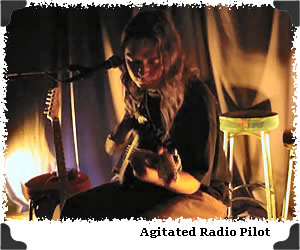 I would like us to release more
music by Irish artists. There are some good things happening in this country
that should be heard. There will be an international compilation of music by
people we admire and discovered through trading. We will re-release the
first two Magickal Folk records on one CD. I’m taking a long break from
booking shows for other people and for UBS in order to immerse myself in
recording and to live a more pleasant life in general. There will be a
song-based double album from Agitated Radio Pilot on Deadslackstring as well
as another Agitated Radio Pilot CD-R on Deserted Village. We’re still recording a new UBS CD.
We’re also assembling a UBS lathe LP for release on Humbug. Most of the work
has been done for these albums but we’re trying to reach a consensus on what
should go on them. We’ve lots of recordings but it’s tricky to arrange them
into coherent albums. Black Colcannon is an all-live album out soon on Ruralfaune. It has new songs as well as versions of songs from 'Shore'.
We’ve a lot of live UBS recordings which will appear on CD-R on many of the
fine labels who have offered to release our music.
I would like us to release more
music by Irish artists. There are some good things happening in this country
that should be heard. There will be an international compilation of music by
people we admire and discovered through trading. We will re-release the
first two Magickal Folk records on one CD. I’m taking a long break from
booking shows for other people and for UBS in order to immerse myself in
recording and to live a more pleasant life in general. There will be a
song-based double album from Agitated Radio Pilot on Deadslackstring as well
as another Agitated Radio Pilot CD-R on Deserted Village. We’re still recording a new UBS CD.
We’re also assembling a UBS lathe LP for release on Humbug. Most of the work
has been done for these albums but we’re trying to reach a consensus on what
should go on them. We’ve lots of recordings but it’s tricky to arrange them
into coherent albums. Black Colcannon is an all-live album out soon on Ruralfaune. It has new songs as well as versions of songs from 'Shore'.
We’ve a lot of live UBS recordings which will appear on CD-R on many of the
fine labels who have offered to release our music.
The Deserted Village People were interviewed by Tony Dale in February 2007. © Terrascope Online 2007